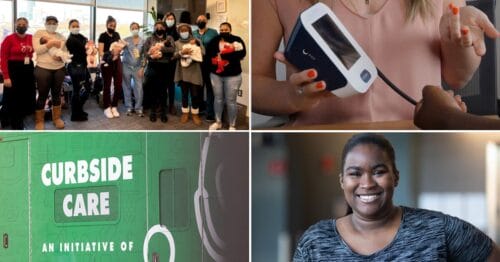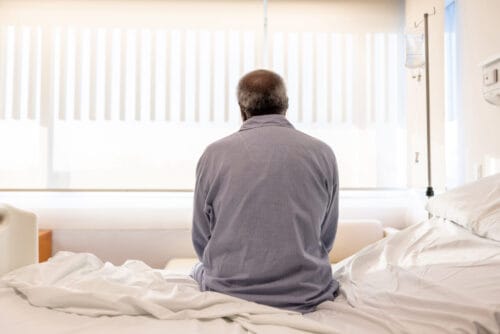Equity Leaders Are Burning Out — So They're Coming Together to Build Resilience
July 6, 2023
By Katie Dillon

Jeff Fernandes, Boston Medical Center
Opening panel presentation (L to R): Shamaila Khan, PhD; Alegna Zavatti, CHI; Tanesha Beckford, MD; Neena McConnico, PhD
Diversity, equity, inclusion, and accessibility colleagues at Boston Medical Center Health System hosted a day-long conference for equity champions to unpack what equity leaders really need to succeed.
When George Floyd was murdered by police officer Derek Chauvin in May 2020, his death sparked protests across the country that many have classified as the birth of a modern civil rights movement. Businesses across the U.S. made promises to double down on equity, diversity, and inclusion efforts. These promises have merit; there is plenty of evidence that shows that increasing diversity, equity and inclusion efforts leads to better outcomes. In medicine and healthcare, having a larger number of providers of color — especially Black providers — leads to stronger, healthier communities.
At the same time, equity work often gets siloed, and many leaders in racial equity face burnout, vicarious trauma, staffing shortages, micro-aggressions, and lack of career advancement. The Office of Equity, Vitality, and Inclusion (EVI) within the Boston University Medical Group and Boston Medical Center’s Inclusion, Diversity, and Equity in Addiction Medicine (IDEAAA) program began noticing these trends in burnout and lack of support for racial equity leaders. These groups began cross-collaborating for a joint mission: a way to get equity leaders across the BMC Health System in one room together to begin learning from one another and support each other in their efforts. This idea snowballed into a half-day conference on the wellness, self-care, and community care that must be in place for equity leaders and DEIA staff members.
The inaugural conference, which took place in June, highlighted the need for systems-change and cross-collaboration between equity leaders across all health systems.
The day opened with a mindfulness activity to center participants in the present moment. Later, leaders hosted a panel discussion with Alegna Zavatti, CHI, BMC’s director of interpreter services; Neena McConnico, PhD, director of diversity, equity and inclusion for BMC’s Department of Pediatrics; Shamaila Khan, PhD, director of BMC’s Center for Multicultural Training and Psychology; and Tanesha Beckford, MD, diversity and inclusion chair of the Emergency Medicine Resident Association. Panelists discussed the challenges and joys of their commitment to diversity, equity, inclusion and accessibility (DEIA). Attendees then broke out into small groups to discuss community and peer support, sustainability, and advancement pathways for equity professionals. Throughout the day, conference attendees were also encouraged to participate in a group art project hosted by Artists for Humanity, a nonprofit that fosters opportunities for under-resourced teens to engage in artistry. The conference closed with a group discussion to unpack the days’ learnings and establish some momentum and connections to move forward.
Cassandra Pierre, MD, MPH, the chair of EVI; Makaila Manukyan, MPP, a senior program manager at EVI; IDEAAA program managers Amanda Fitzpatrick, MPH, and Jules Canfield, MPH; IDEAAA researcher Kaku So-Armah, PhD,; and event emcee, Craig McClay, sat down with HealthCity to dig into why structures that support rest, resilience, and wellness are so critical to DEIA.
HealthCity: Why do you felt like this diversity, equity and inclusion conference needed to happen now?
Craig McClay: Politically, educationally, environmentally, socially, technologically, and legally, there are all these levers that are being pulled right now — if you look at, for example, restrictions in education and identity happening in Florida and other states. For those reasons alone, I think it’s ripe and it’s high time that we start focusing on healing people and restoring community as opposed to trying to harm people and, in effect, causing greater damage across our society.
Jules Canfield, MPH: Amanda [Fitzpatrick], Kaku [So-Armah], and I come from the addiction space, and as part of our program we work to increase diverse representation within the addiction medicine workforce. What we keep finding is that we’re all working in silos. We’re all doing this impactful DEIA work within our own departments and programs, but we’re not having opportunities built in where we can make connections, form relationships, and learn from one another.
The synergy of this event is bringing people together to have those community connections and conversations and networking so that we can really work toward developing a more resilient DEIA workforce and space on the medical campus.

BMC’s Cassandra Pierre, MD, MPH, and Amanda Fitzpatrick, MPH, at one of the conference’s breakout sessions. (Jeff Fernandes, Boston Medical Center)
Kaku So-Armah, PhD: People have been doing this work for a long time, and we are slowly beginning to celebrate these people and their work. This event is an extension of that.
There are lots of threats to DEIA that are looming, and I’ve had several conversations about these threats in smaller spaces, and I want us to have a bigger conversation about what [those threats] might mean for our work moving forward.
HC: What are some of the most common things that you either hear from people or experience yourself while doing DEIA or equity work?
Cassandra Pierre, MD, MPH: Community-building is the heart, but we hope to also find pathways to ensure that the work that people do is recognized as intellectual work, is protected as such, and there is a platform for people to gain recognition and academic advancement.
Another big thing is that people have not necessarily had [community] to share the struggles inherent to equity work. Sometimes things happen — Derek Chauvin’s trial or other shootings of Black men — and they may go unremarked upon in various workplaces. Having this community to identify and say, “Hey, look, I really need to talk to someone” is essential. People really need that outlet. It is critical for our vitality and sense of belonging.
HC: Why is it so important to center self-care and rest and wellness in equity work?
CP: We’ve seen a huge spike of thoughts about leaving academic medicine among people of color, especially Black women. It’s multifactorial, but part of it is due to the sense of not belonging, also the sense of overwork, being burdened with multiple tasks. And the cultural focus right now is that rest is resistance. Rest is the ability to form our own agendas and take a step back and figure out what’s important for us and asserting our value.
And I think that’s incredibly important for people who are doing DEIA work. We have been asked to tell people why racial equity is important and many different people are in different periods of learning on this subject and it can be exhausting. There’s this vicarious trauma, the microaggressions that we experience, and then the general challenge of having to practice during a pandemic. So the burnout that everyone is feeling may be heightened for these leaders. If we are not creating spaces of rest and thinking about tools for self-care, we will lose more leaders, which will delay advancement in this area. So this is investing in rest and support, sense of community is really component of retaining and growing our workforce.
JC: We have to work on self-care for the community and build spaces that are conducive to our own health and personal wellness as well. And I think that can be a really empowering opportunity for everybody to build that.
We don’t want to promote the message that it’s just all about self-care and it’s all about personal resilience…So how do we see and acknowledge DEIA work as something worthy of advancement and promotion? How do we structure DEIA work sustainably through resourcing and policies so we do not burn out our DEIA leaders?
Amanda Fitzpatrick, MPH: We’re working with a lot of younger learners in the IDEAAA Program, and they’re coming to us and they’re saying, “What is your work-life balance like?” And if we don’t have that ourselves, if we’re not taking the time to rest and recover, we’re just kind of passing [these habits] on to our future pipeline and workforce development.
Makaila Manukyan, MPP: We don’t want to promote the message that it’s just all about self-care and it’s all about personal resilience. We started with a panel that focused on the leadership across campus and their experience with maintaining vitality doing this work. So how do we see and acknowledge DEIA work as something worthy of advancement and promotion? How do we structure DEIA work sustainably through resourcing and policies so we do not burn out our DEIA leaders?
In addition to acknowledging the vitality and the individual things that we can do, we intentionally closed the event with [a conversation about] what we can do together to create a culture that is promoting vitality. You spend a lot of time at work and being recognized is part of vitality.
CM: For me, self care has always been about community care. I keep coming back to that proverb: If you want to go fast, go alone. If you want to go far, go together.
This interview has been edited and condensed for length and clarity.


